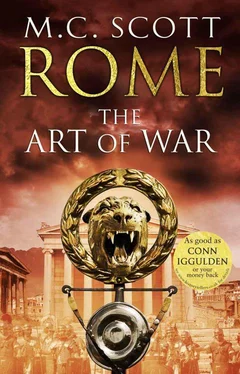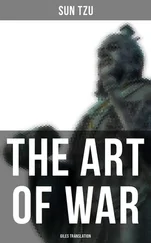M. Scott - The Art of War
Здесь есть возможность читать онлайн «M. Scott - The Art of War» весь текст электронной книги совершенно бесплатно (целиком полную версию без сокращений). В некоторых случаях можно слушать аудио, скачать через торрент в формате fb2 и присутствует краткое содержание. Жанр: Исторические приключения, на английском языке. Описание произведения, (предисловие) а так же отзывы посетителей доступны на портале библиотеки ЛибКат.
- Название:The Art of War
- Автор:
- Жанр:
- Год:неизвестен
- ISBN:нет данных
- Рейтинг книги:3 / 5. Голосов: 1
-
Избранное:Добавить в избранное
- Отзывы:
-
Ваша оценка:
- 60
- 1
- 2
- 3
- 4
- 5
The Art of War: краткое содержание, описание и аннотация
Предлагаем к чтению аннотацию, описание, краткое содержание или предисловие (зависит от того, что написал сам автор книги «The Art of War»). Если вы не нашли необходимую информацию о книге — напишите в комментариях, мы постараемся отыскать её.
The Art of War — читать онлайн бесплатно полную книгу (весь текст) целиком
Ниже представлен текст книги, разбитый по страницам. Система сохранения места последней прочитанной страницы, позволяет с удобством читать онлайн бесплатно книгу «The Art of War», без необходимости каждый раз заново искать на чём Вы остановились. Поставьте закладку, и сможете в любой момент перейти на страницу, на которой закончили чтение.
Интервал:
Закладка:
Each door was marked with a sign that identified the legion or emblem of a departed husband. Eighth along on the left a pair of oak leaves was engraved above the lintel: that was the sign I had been given. There were no Guards outside, none obviously watching. I walked on past to the western end of the street and the Inn of the Crossed Spears.
It’d always been a favourite of the Praetorian Guard and clearly still was. It was heaving with men in uniform and men who had only just shed their uniforms. And tonight, of all nights, the management had hired a troupe of acrobats, which meant, in turn, that all the charlatans of the street had slunk out of their hiding places and come to make the most of off-duty men with ready money.
There was an astrologer, one of the many who hadn’t fled the city yet. Not far off was a salt-haired, owlish little dream-teller, and beyond him an ice-blonde Nordic woman who dealt in philtres and curses, ready to etch the name of a rival on a slab of lead to be thrown into an open grave that ill fortune might follow the one named, just as ill fortune followed those named in the lead lottery two days before in the Capitoline temple.
What I discovered in this inn, listening to the men talking, was that a dozen of those named in the lottery had already died, men who had been less careful when they returned to Rome, who’d probably been there for months and thought themselves safe.
Each name branded itself on my liver, each death was like wood hurled on to the fire that burned in my heart, sending it roaring until my blood fizzed in my ears and my head rang. I made myself breathe slowly, look around, smile, join the jokes.
I passed the dream-teller and threw a coin, laughing, and then, in a flush of pretend goodwill, bought a drink for myself and three junior officers of the Guard who stood in a cluster nearby. They were strangers to Rome, these men; they didn’t know me, and I didn’t know them, but I knew their like and how to play them with the right mix of deference and reverence, and the offer of wine; I was them once, or their like.
The risk seemed to work, for the officers clapped me on the shoulder and bought me a drink in return, and I had that giddy feeling of unnatural luck, as if the gods had cloaked me in more than simply four months’ growth of beard and a worn leather hat. I accepted the beaker of raw wine that was pressed on me, though I spilled more than I drank, and I used the centurions as a shield while I kept my eye on the oak-leaf door halfway along the widows’ street; I could just see it from where I stood without straining.
Presently the centurions went on their way. I was heading back to buy another drink when a hand caught my wrist.
‘Do you dream of oak leaves, carter?’
It was the dream-teller. Small, dry, with a face like old driftwood crusted with salt-white hair, the man was impossible to age. I shook his hand off my arm and would have struck him, but I remembered who I was: a drunken carter.
‘I dream of wine,’ I said, thickly, ‘and then women.’
‘Do you so?’ Sharp eyes stitched across my face, pinning the lie. ‘When you are ready to dream of oak leaves, come and find Scopius and he’ll tell you the fortune they bring.’
I was a carter; my only need for fortune was in good sales. Tugging on my hat, I forced a grin.
‘I’ll be gone before that, old man, while you’ll be lucky if you’re still alive. All soothsayers are to be out of the city by the first of October, or they’ll sew you in a sack with a snake and a dog and throw you in the Tiber.’
‘They won’t sack me.’ Scopius had the gaze of an owl, if an owl had eyes the colour of a dusk sky. ‘I’m a dream-teller, not an astrologer. I know nothing about the stars, only about the dreams that grow beneath them. Come back when you’re ready, carter.’
It was the edge he put on that last word that destroyed my evening. If he knew, who else?
Alert now, with an itch between my shoulder blades, I turned away and pretended a fascination with the acrobats.
In the short time I had been distracted, they’d stretched a tightrope across the street from one wall to the other, and now they were dancing along it, leaping up on to each other’s shoulders, building a six-man pyramid with the lower three all balanced on the rope.
I thought at least the small one on top and definitely the blonde one in the middle row were girls. Looking more closely, I became sure of it; their tunics were short about the thigh to let them move freely, and belted tight. Their breasts were not full, but they were there, pliable, and firm and lovely.
The top girl, a dark-haired androgyne, leapt high into a neat-tucked somersault and I don’t think I was the only man suddenly to think of bedding her. It was five months since I last had a woman and here was one, near naked, athletic as you like, almost within reach. I thought of the gold in my belt, and what it might buy me. There were houses in Rome, one on the side of the Capitoline in particular, that I had heard of, where you had to show your fortune even to get into it, but once in… there was nothing you couldn’t do, if you were prepared to pay for it.
I had to think of the war and Otho’s death to drag my mind away from that and from the acrobat girls. I got myself another drink and sat down at the entrance to the courtyard to watch the door with the oak leaves carved above the lintel.
It was a lifetime’s instinct, I think, that told me I was not the only one interested in it.
Chapter 8
Rome, 3 August AD 69
The lady Jocasta Papinus Statius
I saw Trabo before I saw Pantera, and yes, I knew him. We had played together as children, my brother had been in love with him for years; I recognized him immediately. He didn’t recognize me.
I was in the courtyard of the Inn of the Crossed Spears. Pantera had sent a message to say he was back in Rome, and that we needed to meet.
How well did I know him? Did anyone claim to know that man? I had met him twice before that I knew of. Seneca did his best to keep his better pupils apart so that none of us, if taken, could reveal the identities of the others, so we only met after his death. The meetings hang in my memory, all of them.
The first was in spring, the bright time of flowers, in Nero’s reign, soon after Seneca’s forced suicide. Gone with him in the same failed conspiracy were Lacan and Piso and Piso’s wife and fifty other good men and women who had cared about the future of Rome. The city was brittle as winter ice with the shock of it. Men talked in whispers, women planned for widowhood and everyone crept from dusk to dawn like mice under the eye of a starving cat, wondering where Nero’s paranoid gaze might fall next.
Pantera had been in Judaea. At my summons, he came to the house of Seneca’s widow, the small, quiet woman who had been restrained from killing herself alongside her husband and now walked in the misery of the recently bereaved. She opened the door to him and then went outside, to see who might be watching, and to give us privacy to talk, that she might not hear what we had to say about her late husband. He had shared many things with her, but even so, there were some matters she was better off not knowing.
So we were alone in Seneca’s spare, quiet house and I’m sure I was not the only one for whom it was full of memories.
The small central atrium had no columns, and only four shuttered windows to the outside with two rooms off. I had arrived first and arranged the room as I needed it, then gone to stand by the window, with the morning sun coming in over my shoulder.
That day, when he walked over the threshold, I saw what he wanted me to see: an unremarkable nobody with a stiff left ankle. I knew from what I’d been told that he had been questioned in Britain and had more scars about his body than you could count, but they were all hidden under a tattered tunic. He was clean, he was presentable, and you wouldn’t have noticed him if you’d passed him in the street.
Читать дальшеИнтервал:
Закладка:
Похожие книги на «The Art of War»
Представляем Вашему вниманию похожие книги на «The Art of War» списком для выбора. Мы отобрали схожую по названию и смыслу литературу в надежде предоставить читателям больше вариантов отыскать новые, интересные, ещё непрочитанные произведения.
Обсуждение, отзывы о книге «The Art of War» и просто собственные мнения читателей. Оставьте ваши комментарии, напишите, что Вы думаете о произведении, его смысле или главных героях. Укажите что конкретно понравилось, а что нет, и почему Вы так считаете.












